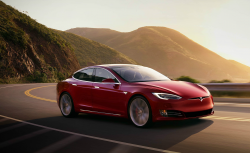
— A Tesla Model S crash in Florida that killed two teens will be investigated by the National Transportation Safety Board (NTSB) to gather information about the battery fire that occurred after the crash.
Safety investigators will also look at the response by the fire department and how the towing company handled the crash.
Killed in the crash were the driver, Barrett Riley, and front seat passenger Edgar Monserratt Martinez, both 18-year-old seniors at Pine Crest School in Fort Lauderdale.
A backseat passenger, Alexander Berry, 18, was injured when he was ejected from the car when it went off the road and slammed into a concrete wall.
Witnesses report the Model S burst into flames immediately after impact, trapping Riley and Monserratt in the burning car. Bystanders tried to intervene but were blocked by the heat and flames and both teens were pronounced dead at the scene.
The NTSB doesn't believe the semi-autonomous feature "Autopilot" was engaged at the time of the crash. Current evidence suggests speed was the main factor in the crash as witnesses said the car was traveling too fast for that area of road.
Any high-speed crash can cause a typical gasoline-powered car to catch fire, but all-electric vehicle fires are different because the cars are powered completely by lithium-ion batteries. A Tesla Model S battery pack contains more than 7,000 individual cells that combine to weigh more than 1,000 pounds, and each cell can smolder for hours.
Investigators say even if self-driving technology had nothing to do with the crash, an all-electric car presents a challenge to first responders who are afraid of getting shocked, not to mention fire departments that can spend hours on the scene and towing companies worried about battery cells reigniting.
The NTSB says Tesla is invited to be a party to the investigation so the automaker can provide technical assistance, but it's yet to be seen how well that will work considering the last time Tesla was invited as a party.
Last month the NTSB said it revoked Tesla's party status in an investigation of a fatal Model X SUV crash in California. Federal investigators said Tesla broke the rules by releasing public statements about the crash, including possible reasons the crash occurred.
The NTSB says its investigations can easily take 12 months and longer to complete, but accused Tesla of assuming it had everything figured out shortly after the fatal crash. Saying Tesla did a "disservice to the investigative process and the traveling public," investigators decided to go it alone to determine what caused the crash.
However, Tesla said it "chose to withdraw from the agreement" so it could "correct misleading claims that had been made about Autopilot."
Although Tesla may be getting much of the attention from federal investigators, other companies have been the target of investigations due to battery fires.
Federal investigators have stepped in on lithium-ion fires in the past, including a 2013 incident involving a Boeing 757 and a battery fire in a Chevrolet Volt car.




